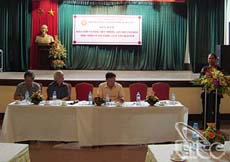The preservation and development of the Tay Nguyen (Central Highlands) cultural features must respect principles of diversity, said Luong Hong Quang, deputy head of the Vietnam Institute of Culture and Arts Studies.
 Speaking at a one-day workshop on preserving and developing unique cultural values of the region in Hanoi on Aug. 29, Quang stressed it is necessary to consider factors of tradition, modernity and nationality and that people should not see ethnic group cultures as closed and unchanged entities.
Speaking at a one-day workshop on preserving and developing unique cultural values of the region in Hanoi on Aug. 29, Quang stressed it is necessary to consider factors of tradition, modernity and nationality and that people should not see ethnic group cultures as closed and unchanged entities.
"We need to identify and inventory cultural genres and performances of ethnic minority groups, artisans and regions to assess their actual state and have proper preservation measures in place," Quang said. He added that these should be done scientifically with the participation of local people.
Quang's statement that preservation should take local people's livelihood into consideration was shared by other participants.
"The restoration and conservation of traditional crafts of the ethnic groups is not so hard," said composer Linh Nga Niek Dam, a Tay Nguyen culture researcher.
"The point is how to find markets for the handicrafts and improve the craftsmen's living standards from these products."
Dam herself was involved in a project of training brocade embroiders and bamboo and rattan weavers among the M'Nong people in Dak Nong province.
As a result of the project, the local products increased both in quantity and quality and were popular souvenirs for tourists to the region.
Ksor Phuong, a Chu Ru from Lam Dong province, said she made pottery whenever she had free time, however, selling the pottery didn't bring her as much money as farming did.
All adults in her village knew how to make pottery but the trade didn't help them earn a living, they had to work in other fields to guarantee their lives.
Nguyen Van Hanh, vice director of the Gia Lai Department of Culture, Sports and Tourism, said protecting traditional handicraft was necessary to protect the Central Highlands culture.
"The authorities should create good conditions for people to develop their traditional trades, especially to find markets for their products," he said.
The workshop is part of the on-going festival of the Central Highlands culture which opened on Aug. 28 with a performance of 300 artists and people.
"The festival will enhance mutual understanding and solidarity between ethnic groups and encourange them to respect cultural values," said Ho Anh Tuan, Deputy Minister of Culture, Sports and Tourism.
The event also created a chance for the ethnic people in the Central Highlands to exchange with each other.
The event will be held until Sept. 1 at the Culture and Art Exhibition Centre, 2 Hoa Lu Street, Hanoi. Entry is free.